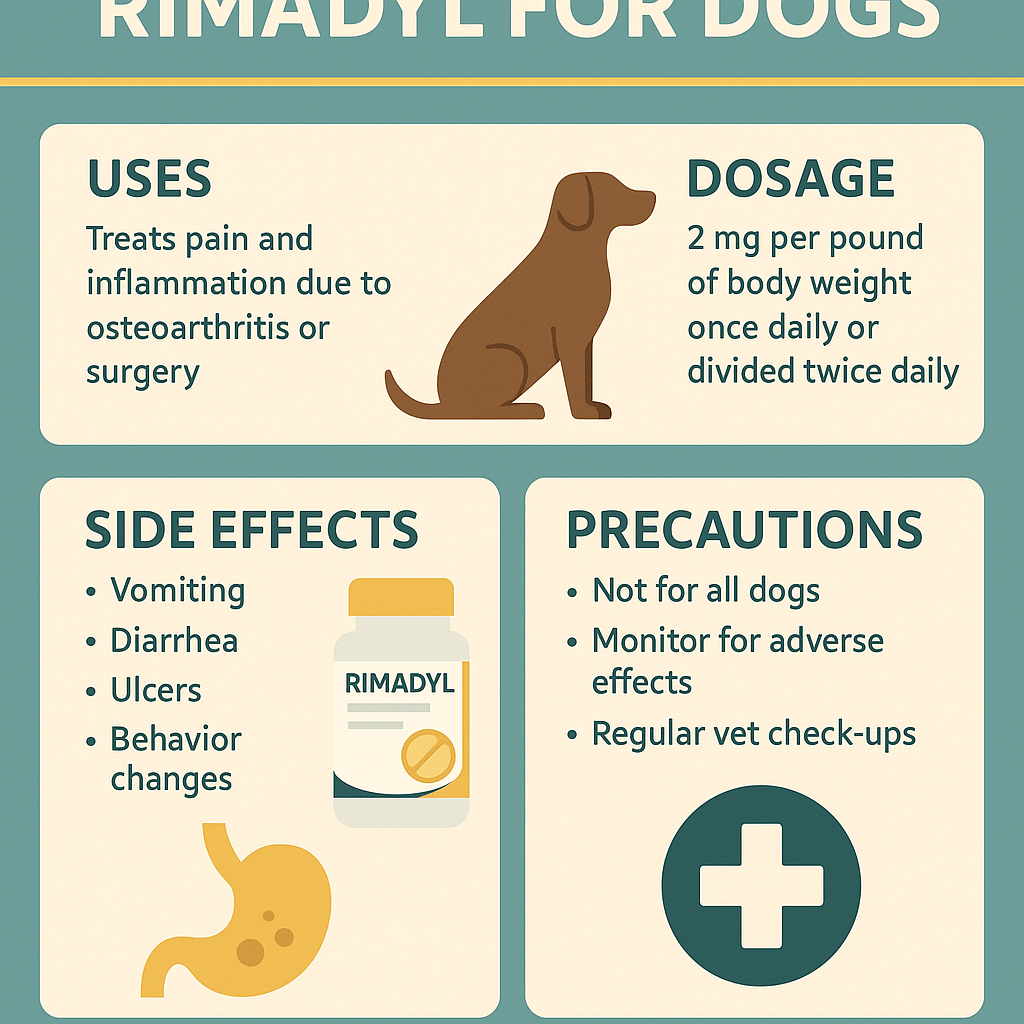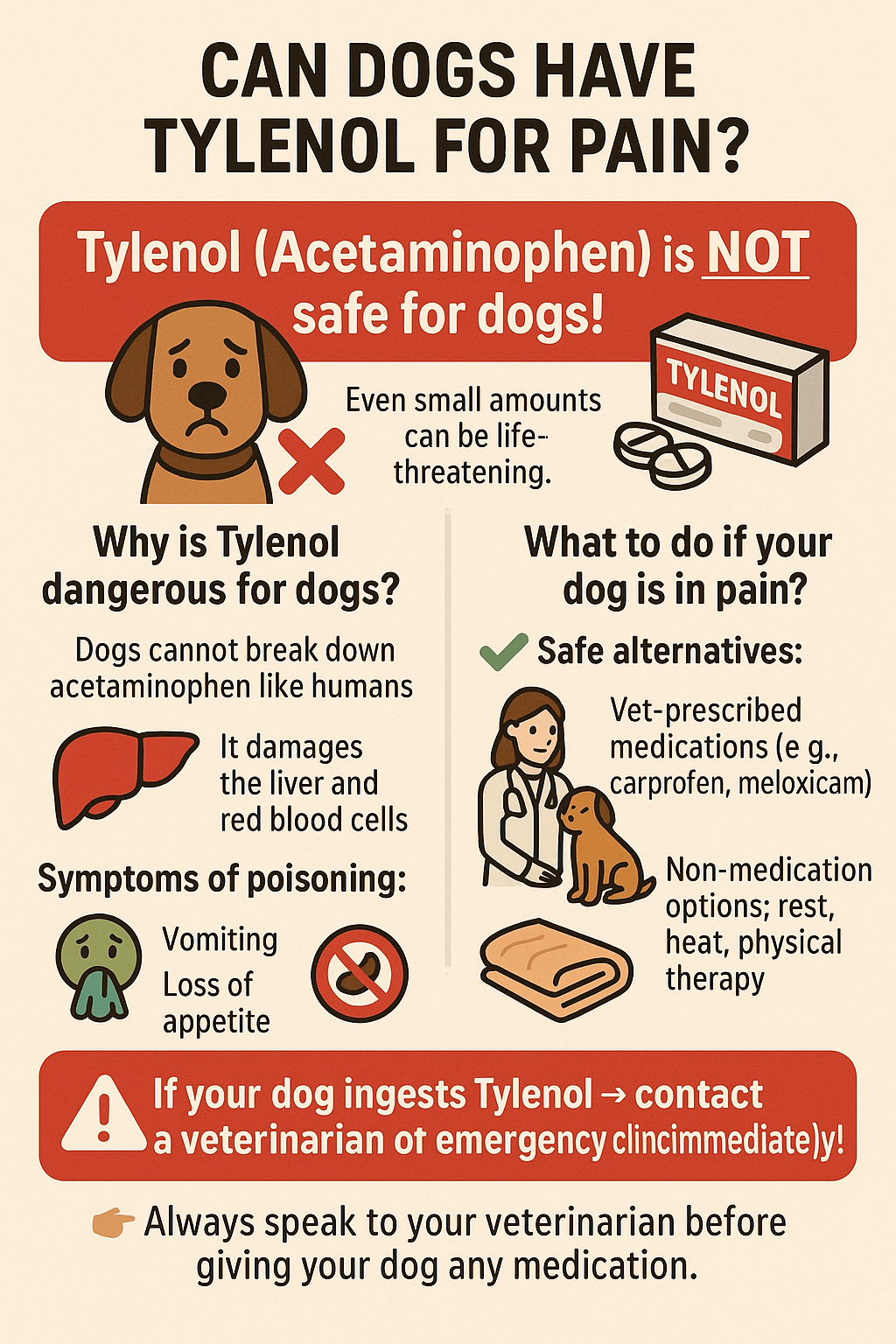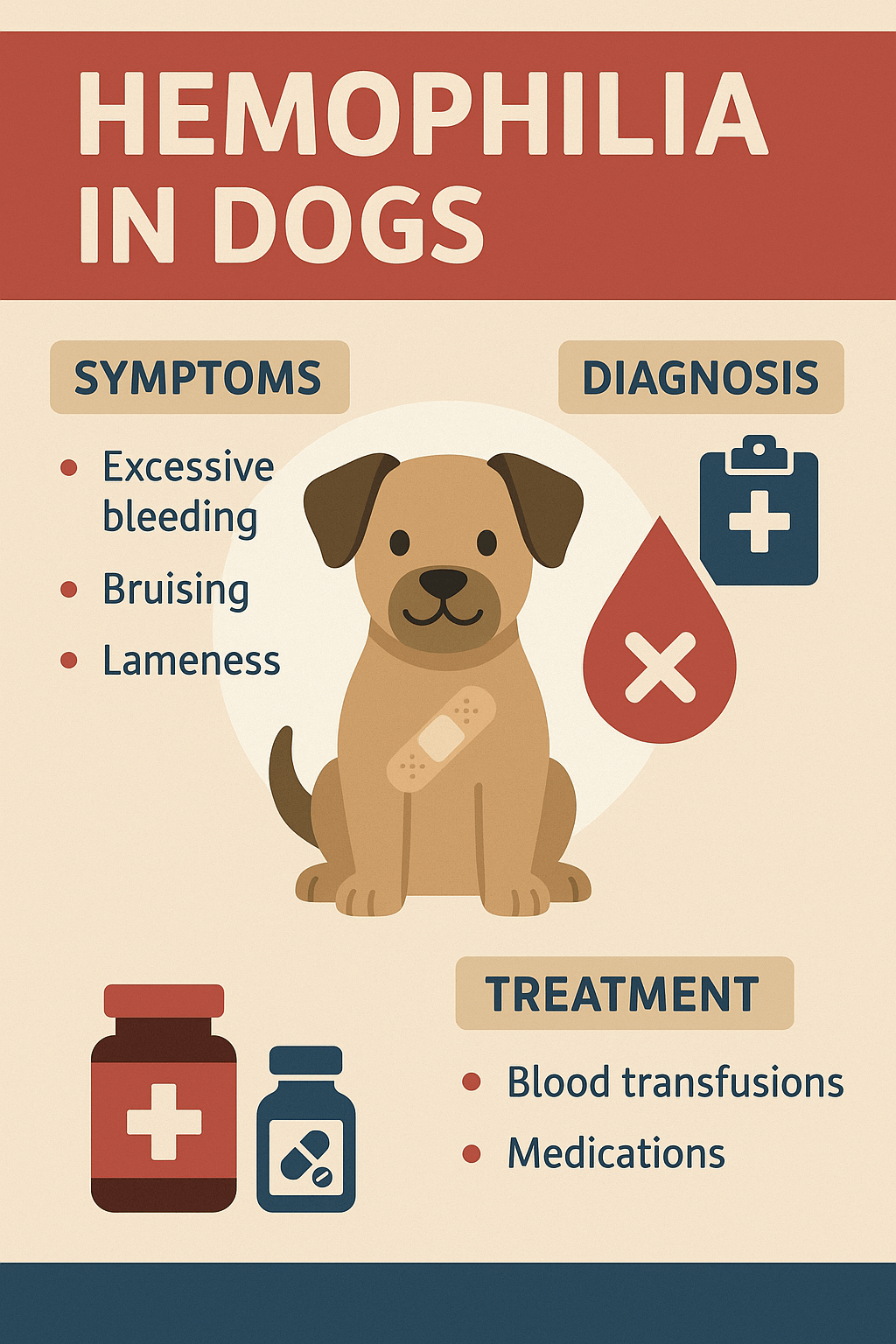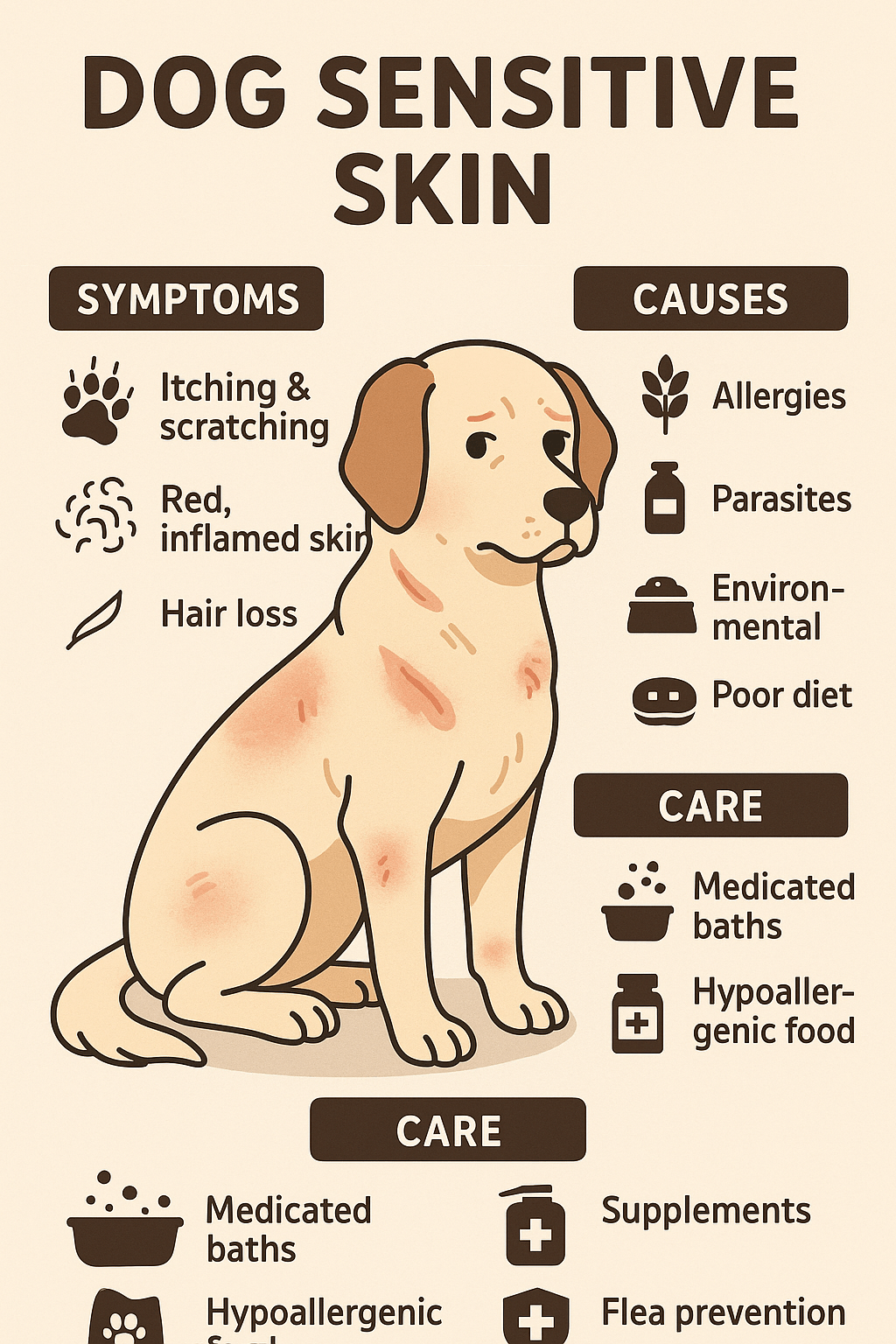Kidney Infection in Dogs: What Every Pet Owner Needs to Know
Kidney infections, also known as pyelonephritis, are a serious health concern for dogs. While the kidneys play a vital role in filtering waste and maintaining balance in the body, infections can disrupt their function and lead to severe complications if left untreated. Understanding the signs, causes, and treatment options for kidney infections is crucial for ensuring your dog’s well-being. This guide will walk you through everything you need to know about kidney infections in dogs, from prevention to recovery, so you can provide the best care for your furry companion.
Expert Insight: Understanding Kidney Infections in Dogs
“Kidney infections are not all that common, but any dog that has a history of bladder infections is at increased risk. The infections can affect dogs of all ages but are diagnosed more often in females that are middle-aged or older.”
Symptoms of Kidney Infection in Dogs
Recognizing the symptoms of a kidney infection early can make all the difference in your dog’s recovery. These signs may vary depending on the severity of the infection, but they often include the following:
Increased Thirst and Urination:
A dog with a kidney infection may drink more water than usual and urinate frequently as their body tries to flush out toxins.Lethargy and Weakness:
Infected dogs often appear unusually tired or uninterested in activities they once enjoyed, signaling discomfort or illness.Loss of Appetite:
A sudden refusal to eat or reduced interest in food can indicate that your dog is feeling unwell.Vomiting or Diarrhea:
Digestive issues such as vomiting or diarrhea may occur as the infection affects the body’s overall balance.Abdominal Pain or Sensitivity:
Your dog may show signs of discomfort when touched around the abdominal area, where the kidneys are located.
If you notice any combination of these symptoms, it’s essential to consult your veterinarian promptly to determine the underlying cause and begin treatment.
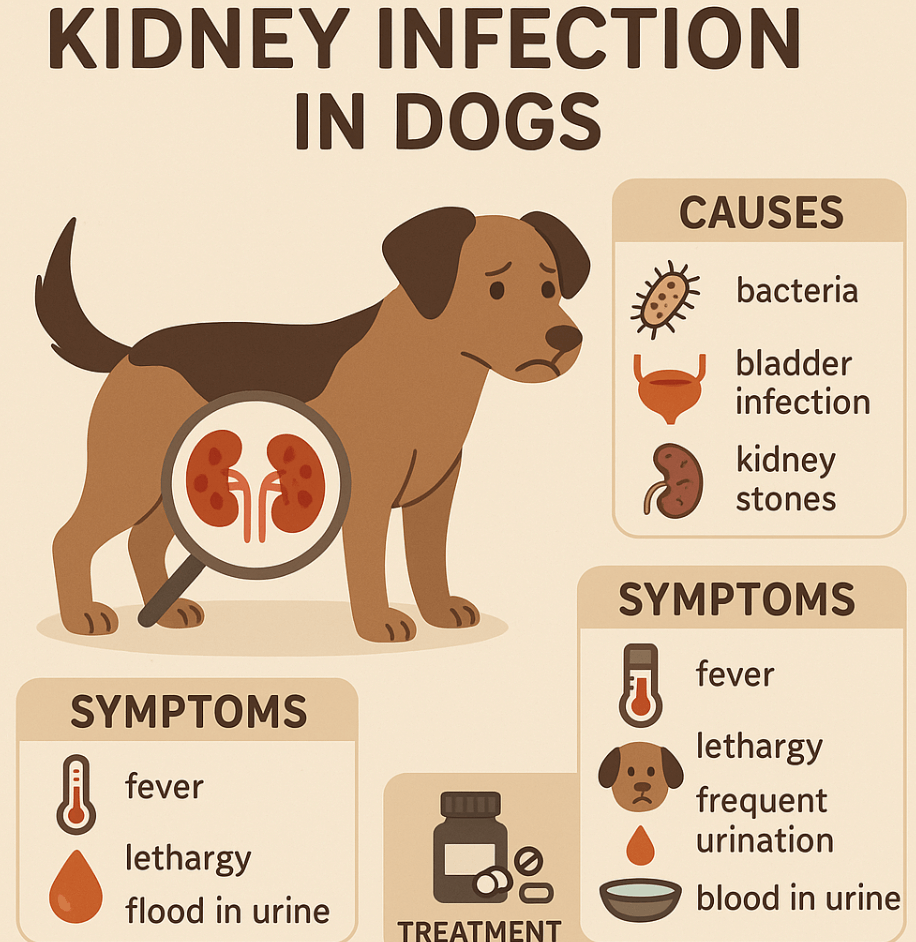
Common Causes of Kidney Infections in Dogs
Kidney infections in dogs don’t develop overnight—they often result from other underlying conditions or external factors. Identifying the root cause can help prevent future occurrences and improve treatment outcomes.
Bacterial Infections:
Bacteria entering the urinary tract can travel to the kidneys, leading to infection. This is one of the most common causes of pyelonephritis.Urinary Tract Infections (UTIs):
Untreated UTIs can progress to kidney infections if bacteria spread upward through the urinary system.Immune System Weakness:
Dogs with weakened immune systems due to age, illness, or medication may be more susceptible to kidney infections.Kidney Stones or Blockages:
Obstructions in the urinary tract can create an environment where bacteria thrive, increasing the risk of infection.Trauma or Injury:
Physical damage to the kidneys or surrounding areas can make them vulnerable to bacterial invasion and subsequent infection.
Understanding these causes allows pet owners to take proactive steps in protecting their dogs’ kidney health and preventing complications.
Check this guide 👉Dog Kidney Cancer Symptoms: Best 7 Expert Tips!
Check this guide 👉Kidney Stones in Dogs: Best 7 Expert Tips!
Check this guide 👉Dog Kidney Disease Diet: Best 7 Expert Tips!
Preventive Measures for Kidney Health | Signs Your Dog May Need Immediate Care |
|---|---|
Provide fresh, clean water daily | Sudden inability to urinate |
Feed a balanced, high-quality diet | Severe abdominal pain or swelling |
Schedule regular vet check-ups | Persistent vomiting or diarrhea |
Keep your dog’s living area clean | Blood in urine |
Monitor for changes in behavior | Extreme lethargy or collapse |
Treatment Options for Kidney Infections in Dogs
Treating a kidney infection requires a tailored approach based on the severity of the condition and your dog’s overall health. Early intervention is key to improving outcomes and preventing long-term damage.
Antibiotics:
Most kidney infections are treated with a course of antibiotics to target and eliminate the bacteria causing the infection.Fluid Therapy:
Intravenous fluids may be administered to rehydrate your dog and support kidney function by flushing out toxins.Pain Management:
If your dog is experiencing pain, veterinarians may prescribe medications to alleviate discomfort during recovery.Dietary Adjustments:
A specialized diet low in protein and phosphorus may be recommended to reduce strain on the kidneys and promote healing.Follow-Up Care:
Regular monitoring and follow-up appointments ensure the infection has cleared and prevent potential relapses.
With proper treatment and care, many dogs recover fully from kidney infections and regain their vitality.
How to Support Your Dog During Recovery
Recovery from a kidney infection can take time, and your role as a pet owner is crucial in helping your dog heal. Here are some ways to support them during this period.
Provide a Quiet Space:
Allow your dog to rest in a calm, comfortable environment free from stress or disturbances.Encourage Hydration:
Ensure your dog has constant access to fresh water to aid in flushing out toxins and supporting kidney function.Monitor Their Progress:
Keep track of your dog’s symptoms and report any changes to your veterinarian immediately.Administer Medications as Directed:
Follow your vet’s instructions carefully when giving antibiotics or other prescribed treatments.Offer Gentle Exercise:
Light walks or playtime can help maintain muscle tone without overexerting your recovering pup.
By providing attentive care and creating a supportive environment, you can help your dog bounce back from a kidney infection stronger than ever.
Risk Factors for Kidney Infections
Certain factors increase a dog’s likelihood of developing a kidney infection. Being aware of these risks can help you take preventive measures and reduce the chances of your dog falling ill.
Age:
Senior dogs are more prone to kidney infections due to declining organ function and weaker immune systems.Underlying Health Conditions:
Diseases like diabetes or Cushing’s syndrome can compromise kidney health and make infections more likely.Dehydration:
Chronic dehydration stresses the kidneys and creates an environment conducive to infection.Poor Hygiene Practices:
Unclean living spaces or improperly sanitized food bowls can expose dogs to harmful bacteria.Genetic Predisposition:
Some breeds are genetically predisposed to kidney issues, making them more vulnerable to infections.
Addressing these risk factors proactively can significantly lower your dog’s chances of developing a kidney infection.
Home Remedies to Support Kidney Health
While professional veterinary care is essential for treating kidney infections, there are natural ways to support your dog’s kidney health at home. These remedies complement medical treatment and promote overall wellness.
Herbal Supplements:
Herbs like dandelion root and parsley are believed to support kidney function, though you should consult your vet before use.Probiotics:
Probiotic supplements can boost gut health and strengthen the immune system, aiding recovery from infections.Coconut Oil:
Adding small amounts of coconut oil to your dog’s food may have antibacterial properties that benefit kidney health.Warm Compresses:
Applying warm compresses to the abdomen can soothe discomfort and relax tense muscles.Limited Salt Intake:
Reducing sodium in your dog’s diet helps ease the workload on their kidneys and promotes better filtration.
Incorporating these remedies into your dog’s routine can enhance their recovery journey under veterinary supervision.
Importance of Early Detection
Early detection of kidney infections can save your dog’s life and prevent irreversible damage. Recognizing subtle warning signs and acting quickly ensures the best possible outcome for your pet.
Behavioral Changes:
Subtle shifts in behavior, such as increased clinginess or withdrawal, can signal underlying health issues.Weight Loss:
Unexplained weight loss often accompanies kidney problems and shouldn’t be ignored.Changes in Urine Color or Odor:
Cloudy, dark, or foul-smelling urine may indicate an infection requiring immediate attention.Persistent Bad Breath:
Foul breath with a metallic odor can suggest toxin buildup caused by compromised kidney function.Swollen Limbs or Face:
Fluid retention, visible as swelling, is a red flag for advanced kidney issues that need urgent care.
Staying observant and proactive enables you to catch kidney infections early and give your dog the best chance at a full recovery.
Frequently Asked Questions About Kidney Infections in Dogs
Can a kidney infection be fatal for my dog?
If left untreated, a kidney infection can lead to life-threatening complications. However, prompt treatment significantly improves survival rates.
How long does it take for a dog to recover?
Recovery times vary depending on the severity of the infection, but most dogs show improvement within 1-2 weeks of starting treatment.
Are certain breeds more prone to kidney infections?
While any dog can develop a kidney infection, older dogs or those with pre-existing kidney issues are at higher risk.
What should I do if I suspect a kidney infection?
Contact your veterinarian immediately for a thorough examination and diagnostic tests to confirm the diagnosis.
Can diet prevent kidney infections?
A healthy, balanced diet supports overall kidney health, but it cannot guarantee prevention. Regular vet visits are also essential.
Prioritizing Your Dog’s Kidney Health
Kidney infections in dogs are a serious but treatable condition that requires vigilance, timely intervention, and ongoing care. By understanding the symptoms, causes, and treatment options, you can play an active role in safeguarding your dog’s health. Remember, prevention is just as important as treatment—regular vet check-ups, a nutritious diet, and a clean environment go a long way in keeping your furry friend happy and healthy. With love, attention, and the right resources, you can help your dog overcome a kidney infection and enjoy many more joyful years by your side.
Rimadyl for Dogs: Best 7 Expert Tips! Discover expert advice on using Rimadyl safely, managing pain, and improving your dog’s mobility with trusted veterinary insights.
Can Dogs Have Tylenol for Pain? Best 7 Expert Tips! Discover the risks, safe alternatives, and expert advice on managing your dog’s pain effectively while avoiding harmful medications.
Understanding Hemophilia in Dogs: Best 7 Expert Tips! Discover expert advice on managing hemophilia, recognizing symptoms, and ensuring your dog’s well-being with practical care strategies.
Understanding Dog Sensitive Skin: Best 7 Expert Tips! Discover expert advice on managing dog sensitive skin, relieving irritation, and improving your pup’s comfort with practical solutions.

